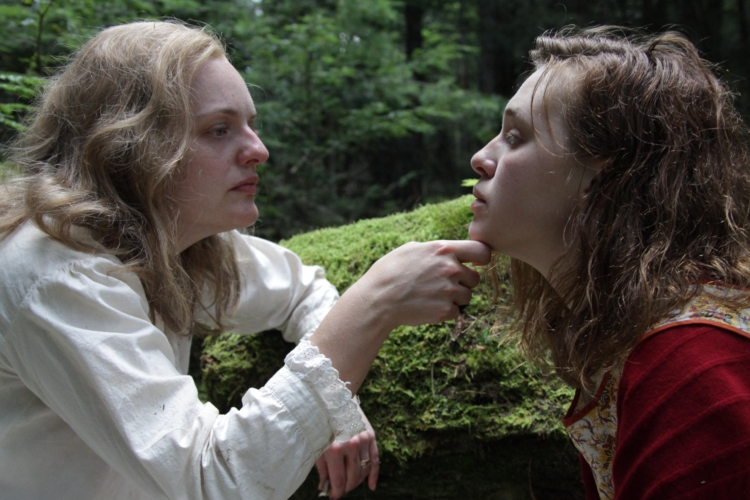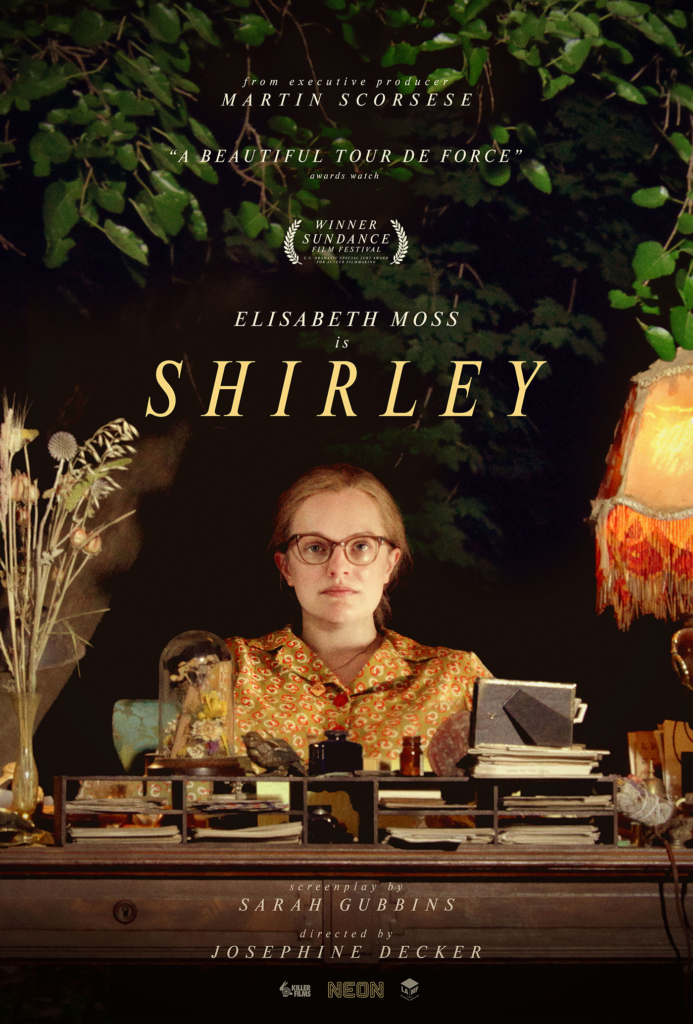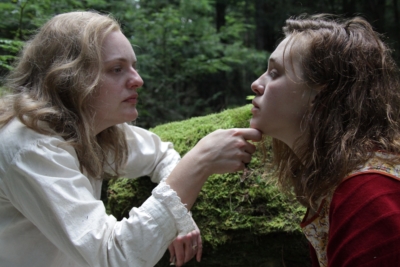The film director on translating the life of horror writer Shirley Jackson from page to screen.

The new film Shirley, directed by Josephine Decker, meticulously layers both literary references and real-life events. It’s a biopic about the very real, very famous horror writer Shirley Jackson (played by Elisabeth Moss), best known for The Haunting of Hill House. But the film itself is based on the fictional novel Shirley, by Susan Scarf Merrell, about a young couple who moves into Jackson’s Bennington, Vermont, house that she shares with husband, critic, and professor Stanley Edgar Hyman (Michael Stuhlbarg). Writer Sarah Gubbins adapted the screenplay.
In the film, Jackson becomes transfixed by her young tenant, Rose (Odessa Young), who eventually becomes the muse and stand-in for Paula, the subject of Jackson’s 1951 novel Hangsaman, based on the real-life disappearance and unsolved mystery of a Bennington student named Paula Jean Welden (Paula’s name was changed to Natalie Waite in Hangsaman). While the men spend most of their days on campus, Rose and Shirley begin to forge a tumultuous, codependent relationship around the estate.
“There’s a timelessness to the way [Jackson] was writing about institutionalized systems of oppression, which were horrifying, and also the interesting relationship she had to the townspeople in her work, which was very ominous,” says Decker. “She was also writing a lot about the horrors of being a woman at that time.” The film is out in virtual theaters now.

What was the experience like, taking someone else’s script and putting your own vision to it?
Complicated. Sarah [Grubbins] wrote a great script, which is the reason I wanted to make it. I could see the dark beating heart of this movie. But, definitely, it’s a different process to go inside someone else’s writing and then try to visualize that world. It took some deep diving and a lot of talking to Sarah. I think it really comes alive when you’re collaborating with the actors and you can see everything in the space.
Were you familiar with Shirley Jackson’s work beforehand?
I have read We Have Always Lived in the Castle before [I signed on to do the project], but that was the main thing that I had read — besides “The Lottery” — that I connected to. My mind was blown and I was like, “I’ve got to get into this woman more. I need to read everything she’s ever written.” Then the script came to me almost immediately. So it was an exciting opportunity to go into a world I was already itching to enter. I spent the year after I got that script to do a bunch of reading. And once I got the job, I did a ton of reading to prepare for the movie.
Something I love about your movies is that there’s always this uneasy edge, but they’re not flatout horror. What is your relationship to horror or scary things in general?
When I think about horror, I mean, I’m also terrified. I love artistic, scary movies that are also thought-provoking, like Get Out and Us and Midsommar and The Shining. I love those kinds of scary movies, but I can’t watch regular scary movies. I can’t handle it and I also don’t necessarily want to put myself through there. Even as an adult, I had nightmares for two weeks after I saw Midsommar. I had nightmares for four years after I saw Jurassic Park when I was a child.
A lot of my work tends to veer, or it used to and doesn’t necessarily anymore, into horror because I felt like there were these parts of myself that were unexpressed. I needed a place to unleash some of that terror that happens when a part of you is unexplored. The nice thing about growing up is that, I don’t know if “fulfilled” is the right word, but I’m older and I have more of myself completed. I’d actually like to make some kids’ movies. That would be nice. That’s what I would like to do next.
There are so many movies out there about writers, but what I really appreciated about Shirley is how you avoided so many of the tropes we usually see, such as heavy-handed montages of writers scribbling away.
I think that was something Sarah was going for in her script. I think there was only one scene in the whole movie where Shirley is writing. We came up with the idea for Shirley’s voiceover in the edit, because the film was all about her relationship dynamics and how those relationships influenced her writing.
It was about the connection between Shirley and Rose, her muse. It was about the passion between Shirley and Paula, the woman she was writing about. It was about the connection between Shirley and [her husband] Stanley, who was going to criticize and have opinions about her writing. Those dynamics were already the main focus of the script.
Shirley is still an indie, but the budget was a bit larger than your previous films. What was it like to direct a project with some money behind it?
It felt different to have money but it also always feels like somehow there’s not enough, even when you get a lot more than you’re used to. But it was such a rich world, that Shirley and Stanley world.
The main difference is that you don’t have to do everything. There are other people who are in charge of things so I got to really focus on my creative collaborations. I mean, I would have loved six weeks of rehearsals with the actors but we didn’t get that.
When I was making my first two features, I oversaw the whole budget and I made every spending and creative decision. I learned on Madeline’s Madeline that it’s actually good to be involved in the budgetary decisions when you’re a director, because sometimes people can think something’s really, really important that you don’t think creatively is important and then lots of money could be spent on something that you’re not that into.
Overall, I feel really blessed in how supportive our financiers at Los Angeles Media Fund were, and they were really artistically supportive as well. I felt really lucky.
Congratulations on winning the US Dramatic Special Jury Award for Auteur Filmmaking at Sundance for Shirley. You’ve been making movies for a while now, but do you feel like as an auteur you’ve established your aesthetic, or do you feel like it’s still in flux?
Getting that award, I’m very grateful. I also feel like we were a collective auteur. We always talked about how the ghost of Shirley was blessing the project. And I really think she lent strong hands, her spirit, which we were trying to be inspired by. But also that when they said that the award was for excellence across all departments, I really felt like this is really an award that was about how great my team was and how incredible the actors blew our minds and how we had the best production designer, and a cinematographer who was so wildly present. Our costumes, so very thoughtful, and hair, makeup, and lighting — we had a very passionate group of people. And our producers and writer were really so, so supportive of the project. So I feel like “auteur” really means having a great team.
I definitely do not feel fixed to my process — that would be ironic. I like to surprise myself and make things that feel new. My next project is a YA film that I think will be shot very differently from the films that I’ve made previously. A reason why I’ve shot previous work handheld is because I like to prioritize performance, and you can do that more easily when you’re not setting a super technical shot and when a cinematographer can really breathe into the work that the actors are doing.
I would love for my work to feel really different every single time. I would love for my creative collaborators to feel very liberated in the process of our working together and that they can explore things they’ve wanted to try. I try to have my job be a liberator of instincts, and sometimes we shape the instincts together to go towards a common goal. I think “auteur” is a word that implies that I share this credit with a lot of talented people who made this project with me.
With film productions shut down with the coronavirus, what’s it like having your job be on pause?
Right now it’s nice because I have a six-month old who I get to hang out with a lot more than I would if I was in film prep. So that’s a sweet, beautiful experience. At the beginning [of quarantine], this break from work inspired a lot of thoughtfulness. We especially move at high speeds in this profession. There’s a lot of pressure of “Make your next project, make your next project.”
Obviously, the tragedy surrounding [the shutdown] is horrible, but the cultural shifts that had to happen in terms of being thoughtful, and being thoughtful of other people, and just moving slower, I’m grateful for it. But now that everyone has figured out how to use Zoom, it’s all of a sudden gotten more hectic and I’m surprised how busy I suddenly feel. I mean, I’m very hopeful that we can start making movies again soon. My next film is set in a Redwood forest so it will be very much a pleasure to be on that set and be out of a big city and be around creative collaborators. I miss being on set. It’s the best.
